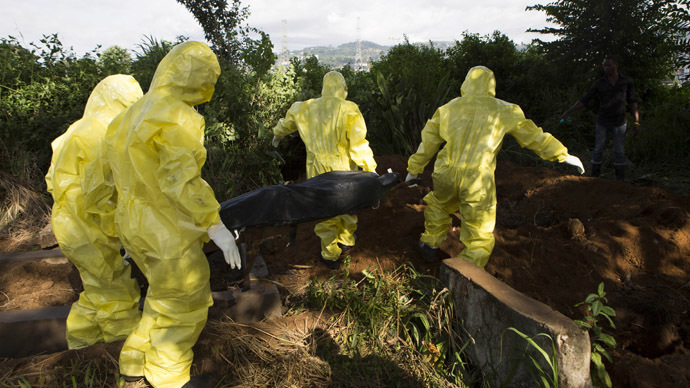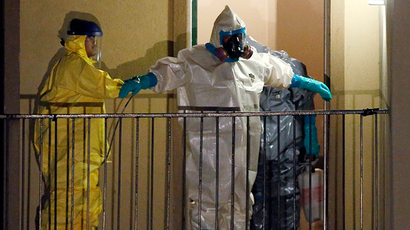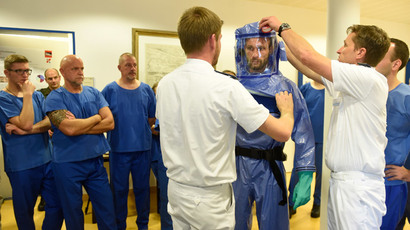Ebola dead left in Sierra Leone streets as gravediggers strike

The highly contagious bodies of those dead from Ebola have been left in the streets across Sierra Leone, where burial teams have gone on strike over unpaid wages, the Sierra Leone Broadcasting Corporation has reported.
Ebola: Evolution of an epidemic (INTERACTIVE
MAP)
The country's deputy health minister Madina Rahman said in a
Wednesday radio interview that the strike was over a week-long
overdue risk allowance to burial teams, and added that the issue
had been “resolved.”
"The health ministry is going to investigate the delay in the
health workers not receiving their money," Rahman said,
according to The Associated Press.
The strike’s organizers have not yet said whether the comment
meant that their walkout was over.
On Tuesday, burial teams in two districts of Sierra Leone,
including the capital, Freetown, announced they were on strike.
"We have decided to stop working until they pay us our weekly
risk allowance," a burial worker Tamba Nyandemoh told
Reuters, arguing the teams had not been paid for two weeks.
Nyandemoh explained the teams, each consisting of 12 workers,
bury between 17 and 35 bodies a day. Workers are paid $100 a week
for the job.
#Ebola safe burial team working to remove & inter dead bodies of ppl suspected to have died of Ebola in #SierraLeonepic.twitter.com/kJVgo3xJVR
— WHO (@WHO) October 7, 2014
Clearing the dead from homes and streets is essential in fighting
the virus, as the bodies are highly contagious. The job has to be
carried out carefully by teams of professionals, wearing special
gear.
Sierra Leone has been among the African nations worst hit by
Ebola, with more than 600 people killed by the disease, according
to the WHO.
A member of a striking burial team who wished not to disclose his
identity, said he did not care “if dead bodies litter all
over the city” if that helps draw attention to the workers’
hardships.
"All we want is our money,” he said, Reuters reported.
“We have been stigmatised in our communities, so let the
government try to pay us our money."
Health Ministry spokesman Sidie Yahya Tunis earlier described the
situation with delayed payments to burial workers as a "very
embarrassing" one.
Sierra Leone authorities also came under fire Tuesday for letting
a shipping container with protective medical gear and mattresses
from the US be held up at a port for more than a month, while the
country was in urgent need of the container’s contents.
An opposition politician, Alpha Chernor Bah, who arranged for the
shipment from the US, lashed out at the authorities for
mishandling the aid.
"The country is in a crisis period, and there should be no
red tape in clearing the container from the port," he told
AP.
‘Enormous economic cost’
The World Bank estimated on Wednesday that the Ebola epidemic
could cost West African nations $32.6 billion by the end of 2015,
if the outbreak continues raging and spreads excessively beyond
the three worst affected countries – Guinea, Liberia and Sierra
Leone.
"The enormous economic cost of the current outbreak to the
affected countries and the world could have been avoided by
prudent ongoing investment in health systems-strengthening,"
World Bank president Jim Yong Kim said in a statement.
If the epidemic is contained in 2014, the economic impact on the
region will still be serious, costing West Africa between $3.8 to
$9 billion, the bank estimated.
A total of 3,439 people out of 7,492 infected have died from
Ebola, according to the most recent estimate by the World Health
Organization. The outbreak, the worst on record, has been most
severe in Guinea, Sierra Leone and Liberia.
The first cases have recently been recorded in the US and Spain,
prompting fears of the deadly virus spreading further across
continents.














